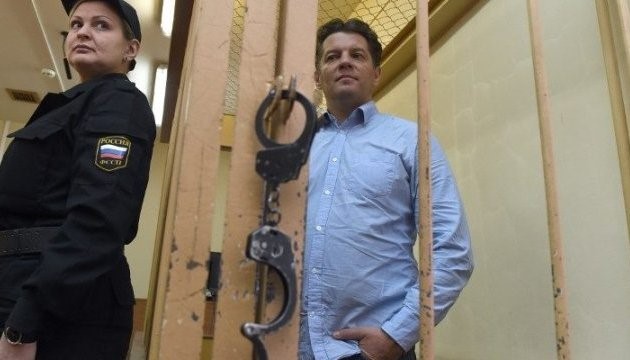Russian prosecutor demands 14-year sentence for Ukrainian journalist

The Russian prosecutor has demanded a 14-year sentence for Ukrainian journalist Roman Sushchenko on mystery spying charges in a ‘trial’ heard before a closed court. The verdict is due at the Moscow City Court on 4 June, although Sushchenko’s lawyer, Mark Feygin believes the sentence has already been written, and points out that there are no acquittals in such cases.
The charges laid could carry a 20-year sentence, so 14 years is not as bad as it could be. Any restraint with the sentence could, Feygin believes, create additional preconditions for a swift exchange and he asserts that negotiations for an exchange are currently underway. How successful these will be, he says, depends of various factors – on the hunger strike by Oleg Sentsov, Ukrainian filmmaker and Kremlin hostage; on the World Cup (hosted this year by Russia) and “on how eager Russia is to return Kirill Vyshynsky”.
Vyshynsky is the Director of RIANovosti Ukraine and was arrested by the SBU on 15 May 2018. While the fact that both Sushchenko and Vyshynsky are journalists may seem an obvious connection in arranging an exchange, Feygin’s assertion that the cases mirror each other seems wide off the mark.
Vyshynsky, who holds both Ukrainian and Russian citizenship, is accused as a Ukrainian of treason. The charges appear to pertain to his work for the Russian state-owned Russia Today during the period immediately following Russia’s invasion of Crimea. He is accused of having taken part in the propaganda drive aimed at persuading Crimeans to support Russian annexation. The SBU has produced a Russian award ‘For services to the Fatherland’, and possibly also another award - ‘For the return of Crimea’.
Those awards, if authentic, would suggest that Vyshynsky’s role was not merely that of a journalist covering events, though clearly such accusations must be proven. There is no suggestion, however, that any part of Vyshynsky’s trial would take part in secret, so it will be possible to assess the grounds for the charges.
Sushchenko is accused, as a Ukrainian of ‘spying’ while on a brief visit to relatives in Moscow in 2016, with the grounds for such charges known only in very broad outline. First the detention hearings, and then the trial were held behind closed doors and Feygin was forced from the outset to sign an undertaking not to divulge any information about the case.
There have been repeated calls for Sushchenko’s release from international bodies and numerous governments, and he was recently honoured ‘For Courage’ by the Andrei Sakharov Committee on Journalism as an Act of Conscience.
Sushchenko has been in Russian detention since September 30, 2016. The then 47-year-old journalist was seized by FSB officers shortly after arriving in Moscow to visit his cousin.
Three days later, the FSB admitted that Sushchenko was in their custody. They claimed that the Ukrainian journalist, who had been working as the Ukrinform News Agency’s Paris correspondent for the past 6 years, was a colonel in Ukraine’s Military Intelligence. They asserted that he had been gathering secret information about the activities of the Russian army and forces of the National Guard and that if this ‘information’ had been leaked abroad, it could have caused damage to the state’s defence capacity.
Journalists planning to visit Russia for the World Cup should be warned that any normal journalist interest in what is happening around them could be viewed as spying if they do not have accreditation. This, at least, can be understood by, Russia’s Foreign Ministry’s response to Sushchenko’s arrest. It concentrated on the fact that Sushchenko had not had journalist accreditation and claimed that he had had no right to engage in journalist activities.
Feygin has been unable to give much information about the ‘trial’, but did earlier indicate that the charge was that the Ukinform correspondent had gathered information about an anticipated invasion of Ukraine by Russia in the summer or autumn of 2016.”. He has also reported that it looks as though Sushchenko was ‘set up’, by being asked to take a disk back to Paris for another journalist. The most disturbing aspect of this story is that Sushchenko had agreed to take the disk for a person he has known for 28 years. Since he was arrested while receiving the disk, the person was almost certainly involved.
Sushchenko has been imprisoned in the FSB-associated Lefortovo Prison in Moscow, with only a very small number of visits allowed from his wife Angela and adult daughter Julia and not one from his 11-year-old son Maxim.
Please write to Roman Sushchenko
All letters tell him and Moscow that he is not forgotten. The letters must be in Russian, and please avoid talking about politics or any other ‘sensitive’ subject.
If Russian is a problem, the following would be fine, maybe with a picture or photo.
Добрый день,
Желаю Вам здоровья, мужества и терпения, надеюсь на скорое освобождение.
Мы о Вас помним.
[Hello, I wish you good health, courage and patience and hope that you will soon be released. You are not forgotten. ]
Address
111020, Moscow, 5 Lefortovsky Val, Lefortovo remand prison No. 2, postbox 201
Sushchenko Roman Vladimirovich (b. 1969)
[Russian: 111020, г. Москва, ул. Лефортовский Вал, 5, СИЗО-2 “Лефортово” ФСИН России, Е20, а/я 201, Сущенко Роману Владимировичу, 1969 г.р





